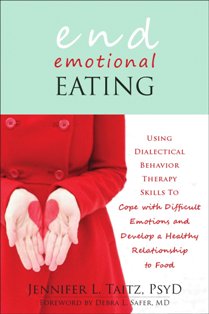
'Tis the season for all but the most dedicated dieters to engage in emotional eating. No dieter plans on eating emotionally from Halloween to New Year's Eve, and yet, that's what the overwhelmed majority end up doing year after year after year. If anyone is equipped to reverse this unhealthy trend, it's Jennifer Taitz, a supervising clinical psychologist and author of End Emotional Eating.
 Taitz's approach to this everyday eating disturbance is based on a proven treatment for life-threatening eating disorders: dialectical behavior therapy. DBT, the mindful first cousin of cognitive-behavioral therapy (CBT), sounds scary complicated, but it's actually an efficient, effective method for managing the emotions that fuel emotional eating. In effect, Taitz's timely antidote to America's seasonal affliction is more than diet-changing, it's life-changing.
Taitz's approach to this everyday eating disturbance is based on a proven treatment for life-threatening eating disorders: dialectical behavior therapy. DBT, the mindful first cousin of cognitive-behavioral therapy (CBT), sounds scary complicated, but it's actually an efficient, effective method for managing the emotions that fuel emotional eating. In effect, Taitz's timely antidote to America's seasonal affliction is more than diet-changing, it's life-changing.
As the director of the dialectical behavior therapy program at the American Institute for Cognitive Therapy in New York, Taitz understands DBT better than most, and certainly better than me. So I was eager to read what the mindful author had written about using DBT skills to cope with difficult emotions and develop a healthy relationship to food. And yet, despite my eagerness, I found myself thinking that infamous dieter's thought: "I'll start tomorrow."
Before trick-or-treaters had come and gone, I gave up the ghost and put in a call to Taitz's Manhattan office. (The good psychologist splits her time between New York and Los Angeles.) What follows are Taitz's thoughtful answers to my persistent questions from that recent phone interview.
Q. I've yet to read your book, but I did read the cover, and it raises more questions than it answers. For starters, how do you define emotional eating?
 A. Emotional eating is eating that's governed by feelings. So often it's driven by a feeling or a cue in the environment rather than a physiological sense of hunger. When you're [in the habit of] eating in response to feelings, you might start to confuse loneliness or other feelings with physiological hunger. More than a conscious [choice], it's a habitual thing. Habits become well-worn paths.
A. Emotional eating is eating that's governed by feelings. So often it's driven by a feeling or a cue in the environment rather than a physiological sense of hunger. When you're [in the habit of] eating in response to feelings, you might start to confuse loneliness or other feelings with physiological hunger. More than a conscious [choice], it's a habitual thing. Habits become well-worn paths.
Q. How about dialectical behavior therapy? What's your simplest, best definition of that?
A. DBT is a treatment that teaches people how to both accept and change at the same time. A lot of therapies focus exclusively on changing or accepting, but DBT focuses on both. The therapy teaches practical skills to help manage emotions, improve relationships, practice mindfulness or present awareness, and cope with a crisis without making it worse. Once my patients learn to manage their emotions better, they not only live better lives, they lose weight.
Q. Given that DBT was developed to help people in severe emotional distress, what inspired you to use this therapy with emotional eaters?
A. I've always been interested in treating people who feel hopeless. As a college student, I volunteered at 1-800-suicide. One thing I noticed is there's a lot of hopelessness about body shape and weight. People of all weights, shapes and sizes worry about their bodies, even those who are quite thin. I've seen a number of people, especially younger adults, who have felt suicidal as a result of defining themselves by their body. DBT is a scientifically supported therapy for binge eating and bulimia that provides some truly empowering lessons. It's for anyone who's preoccupied with their eating who wants to live a full, rich life.
Q. Did you have any personal reasons for applying DBT to emotional eating?
A. There are so many times when there have been cupcakes in my office, and I've had the thought: "Oh, why not?" Personally, emotional eating is something I see all around me. I see people eating for celebration purposes or [using food to help] a friend going through a tough time. A lot of people think that the most comforting thing they can do for another person is to feed them comfort food. Actually, the most comforting thing you can do is to address the specifics of the situation. If you're going through a breakup or you feel lonely, you might want some moral support [more than cupcakes].
Q. The title of your book suggests DBT is a cure for emotional eating. I don't know the research on DBT for eating issues, but I do know that long-standing eating issues are no more curable than the common cold. Is there any evidence that DBT actually ends emotional eating or any eating issue for that matter?
A. I don't believe "end" is an all-or-nothing word. At any point, a person can intervene. In the moment, perhaps a person can learn to notice they're feeling bad, and then move away from the food if they're not physiologically in need. Perhaps a person can notice midway through eating something that they're not actually hungry, and at that point, they can "end." There's no pill you take that cures all. The cure is a process.
Q. How about DBT for body-image issues? Is there any evidence to suggest it's an effective treatment for bad body image?
A. DBT teaches people to notice the way their emotions color their perceptions. Oftentimes, people's emotions govern how they feel about their appearance. When people [complain of] "feeling fat," they're often feeling what Christopher Fairburn at the University of Oxford describes as a "secondary emotion" because it is in the context of feeling some other emotion. Learning to recognize emotional states, [without making the mistake of] of interpreting intense emotions while you're in an intense emotional state, can be quite helpful in learning to see yourself more accurately.
Q. What's urge surfing, and how do you suggest someone surf the urge to devour a bag or cookies or a pint of ice cream?
A. "Urge surfing" is a term developed by psychologist Alan Marlatt from the University of Washington. One of the things he noticed that trips up people who struggle with substance abuse is believing that [unsatisfied] urges rise in a linear fashion. But if we consider our own experience -- what happens if we want ice cream and the ice cream store is closed -- the urge seems to pass. What happens if we want a cup of coffee and the line at Starbucks is long, the urge rises and falls. [Instead of giving in to every passing urge], take a moment to observe and describe an urge, perhaps do something to soothe you or remind you of what matters. A truck driver recently called a radio show I was doing, wanting to know what to do when he's so tired at the end of his shift and the only thing open is drive-through burger place. His main reason for eating was energy, not hunger, so I encouraged him to step back, look at the urge but not fight it, and do other things to soothe himself, such as looking at photos of his children or listening to upbeat music.
Q. Anything else you want to tell me that I didn't ask?
A. A lot of people think this approach is only for those who have the resources to pay for nutritionists, personal trainers and private yoga teachers. Whoever you are, you deserve to take care of yourself with the information that's out there. There are free apps you can download on your iPhone [to help you deal with emotions]. There's a popular one called My Fitness Pal that my patients have found useful. Also, Livestrong is a website with a large database [of apps]. There are other ways to [take care of yourself] that provide peace of mind, like listening to a Tara Brach podcast. A lot of times our minds come up with the story that there's nothing to be done except indulge or judge. We need to create new pathways in the brain that are more compassionate and flexible.
Author photo by Sultan Khan
Jean Fain is a Harvard Medical School-affiliated psychotherapist specializing in eating issues, and the author of "The Self-Compassion Diet." For more information, see www.jeanfain.com.
For more by Jean Fain, L.I.C.S.W., M.S.W., click here.
For more on eating disorders, click here.
If you're struggling with an eating disorder, call the National Eating Disorders helpline at 1-800-931-2237.